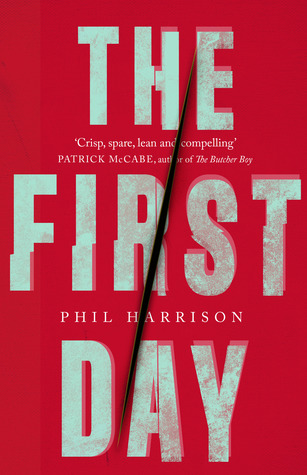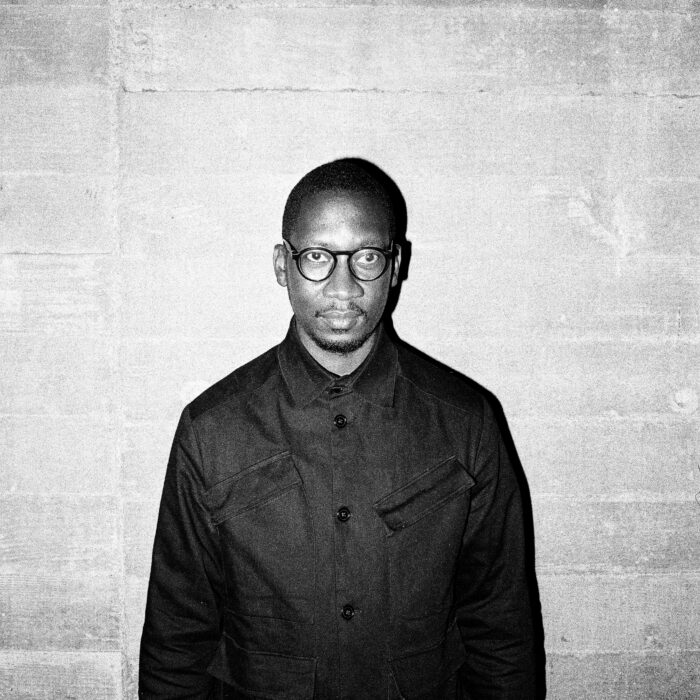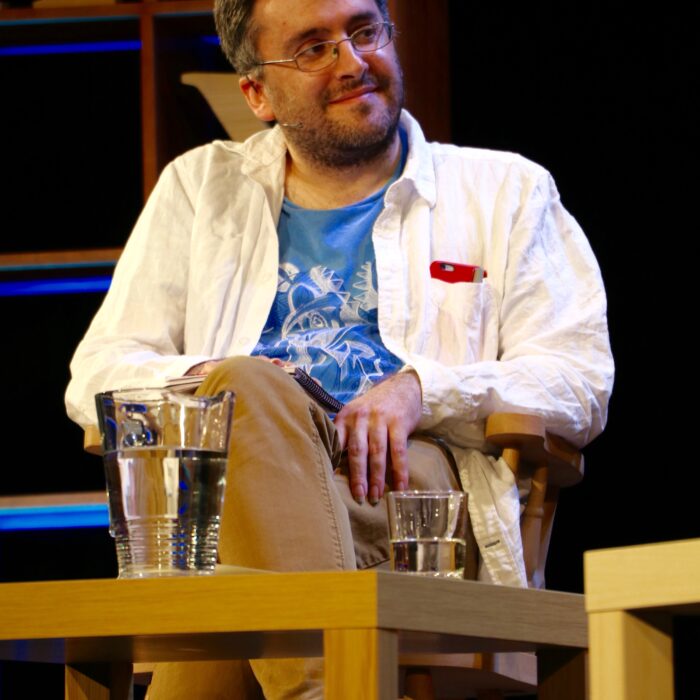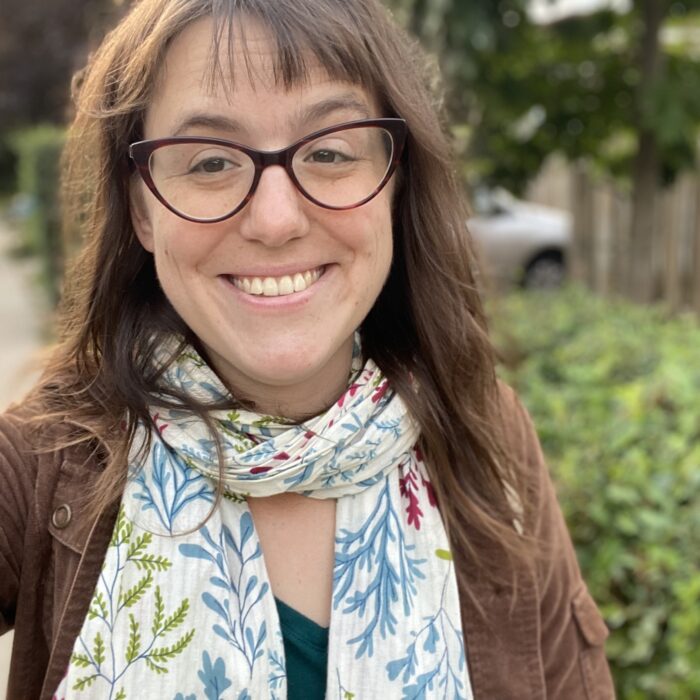You have no items in your cart. Want to get some nice things?
Go shopping As soon as I heard the bass bamboo flute coming in and echoing the opening trumpet statement of Sadhanipa, the second piece of music in Ravi Shankar & Philip Glass’s composition, Passages, I immediately thought of Phil Harrison’s debut novel, The First Day, which I’d reviewed in this organ quite recently.
As soon as I heard the bass bamboo flute coming in and echoing the opening trumpet statement of Sadhanipa, the second piece of music in Ravi Shankar & Philip Glass’s composition, Passages, I immediately thought of Phil Harrison’s debut novel, The First Day, which I’d reviewed in this organ quite recently.
This was a live BBC Proms 2017 performance of the album, Passages, originally recorded back in 1990, with Karen Kamensek as conductor, and Ravi Shankar’s daughter, Anoushka, on sitar. The composition is a delicate interweaving of Philip Glass’s American Minimalism with traditional Hindustani classical music. At first glance, and before hearing a single note, this appears to be a unlikely cultural hodgepodge slap-dashed onto coffee-stained manuscript sheets at half three in the middle of the night, but actually works astoundingly well. Like Phil Harrison’s character, Orr, when he ends up in New York in the second half of the novel. Who knew? In fact, after now listening to the composition in its entirety at this stage twice through con brio, left finger in the ear, I’m convinced Phil Harrison’s novel was inspired and pencilled accordingly from this beautifully profound piece of music. And vice versa.
Passages Track listing:
- Offering
- Sadhanipa
- Channels and winds
- Ragas in a Minor Scale
- Meeting along the edge
- Prashanti (peacefulness)
The conductor, Karen Kamensek, has said that because there’s a ginormous meditative element as part of the Indian tradition and also a ginormous meditative element as part of the Minimalist tradition, in this composition, Passages, there’s a beginning meditation and an ending meditation. Both ginormous. And so too, Phil Harrison’s novel.
Anoushka Shankar has said that Passages ends on a really peaceful note after a lot of drama and dark moments. And so too, Phil Harrison’s novel. Prashanti (peacefulness), the final part of Passages, ends with the Vedic Prayer –
“Oh, Lord. Be benevolent to us. Drive the darkness away. Shed upon us the light of wisdom. Take the jealousy, envy, greed and anger from us, and fill our hearts with love and peace.”
*
Has the story behind this novel been around your head for any length of time screaming to get out?
I wouldn’t say the story as such, but certainly some of the ideas. How far can a person go while equally committed to both his faith and his desire? To what extent does faith and/or desire compromise autonomy?
Did you write many drafts of the novel?
I wrote a couple. The first one had a completely different second half. I liked it, but it didn’t really work – I had let the key characters drift too far from the primary concerns established at the beginning of the book. I threw out 35,000 words – that was a fun day – and started again.
Did you consider telling the story from another character’s perspective?
Not really, though it took a while to get the voice right, and – without giving too much away – the shift in perspective during the book. Even the question of address – not only who is speaking, but to whom, and why – was puzzling. I don’t think I really answered the latter question – but I think the unsettled question helped me get some energy in, which feels vital.
The structure of the novel in two parts and two locations is handled expertly. Your film, The Good Man, which is set in Belfast and Capetown, also uses this technique. Is this an important aspect of your work?
I like dislocation – I’ve spent much of my adult life moving from place to place, living in a few different countries (Ireland, Scotland, South Africa, the US). I prefer character to be revealed than described – putting people into scenarios and seeing what they do.
Did any real life experiences or people inspire this novel?
Not specific people; there were no models for characters. But I grew up in a small religious community not unlike Orr’s – and the various complications and frustrations and kindnesses of that have stayed with me long after I abandoned my faith. I wanted to take those people and that faith seriously, in all their generous, flawed humanity. So in many ways the book is rooted there.
What are the main themes that come up constantly in your writing (if any)?
I’m interested in how people hide from themselves and each other. There are almost no lengths to which people will not go to protect themselves from their own desire. I’m interested in just how possible it is to live as an individual – as Kierkegaard says, to stand on your own before God (or Sartre: before the emptiness of the universe). How possible is it to create your own meaning rather than hand over authority to someone else to do it for you? And what would that look like?
What do you want to achieve when you write? Entertain? Change the world? Write well? Something else? Take this in the context of what you said in a past interview, ‘[I] became increasingly interested in the role of creativity in protest and struggle: how people use photography, poetry, film, music to articulate ideas of identity which move away from and subvert those foisted on them.’
A great question. When I was younger I would have been very explicit about the political content of anything I wrote/created. I’m a progressive, a socialist – I want to see the world made fairer, injustices addressed. One of my favourite pieces of poetry is from Mary’s prayer in the Gospel of Luke: He hath filled the hungry with good things; and the rich he hath sent empty away. But I’m increasingly sceptical of forcing characters into simple political positions, or using them as pawns to make a political point. I’m much more interested in taking characters’ internal lives seriously, with all the complexity and political confusion that entails. I guess that makes me a psychological realist – though as Freud pointed out, realism is a very wide term when it comes to the unconscious. Which pushes me further into the question of form: what way of combining words does justice to the messy human experience?
Are there any no-nos for you in your writing?
Using Comic Sans.
How has your background in film influenced this novel’s pace and structure? Any plans for a screenplay?
No doubt. As mentioned before, I am much more interested in having characters do things than in telling people what they are like – which you have to do in cinema. I’ll definitely write for film again.
Art plays a significant role in this novel (painting, poetry, etc.). A transformative role. It’s remarked in the novel to Sam when he’s working at The Met that painting died as an art form before he was born. Would you like to elaborate on this?
Art seems to me fundamental to the question above of how to be an individual. Art for me is distinct from entertainment; as a way to go deeper into the experience of life rather than distract ourselves. And painting, for me, holds a kind of anachronistic vigour – slow, patient, flat in a world of speed and short attention spans. Unfortunately I can’t paint for shit.
There are many references in the novel to classical music of a relatively more modernist period, in contrast to Sam’s interest in the old masters and the impressionist era. Is this significant?
I’m obsessed with the music Sam listens to: Arvo Pärt, Tavener, Gorecki. But I also love Mos Def, Four Tet, Fela. Bring it all on.
Would you consider yourself working class or middle class and is this relevant for you in your writing practice?
Ha. I was brought up working class, but went to good schools and now have a master’s degree. What does that make me? I’m not particularly interested in the answer to that – but my allegiances and commitments are to the excluded, the outsider, those on the margins.
Is your outlook on life hopeful or despondent or something else entirely?
It seems to me people tend to fall into one of three approaches to life and meaning: repressed (there is a meaning and I must find it – God, nationalism, whatever); tragic (there is no meaning and that’s fucking awful); or comic (there is no meaning – haha, let’s go make some). I go for the comic.
What’s the most influential piece of writing you’ve read?
Probably – quelle surprise – the bible. But also Annie Dillard, Freud, Kafka, and Shoot Magazine.
What’s the last fiction you’ve read?
I’m going to not be a dick and just talk about the last *good* fiction I read: Paul Beatty’s The Sellout, Mary Gaitskill’s Veronica, and Faulkner’s Absalom, Absalom.
Are you working on something new at the moment?
Halfway through a new novel, more or less.
I note that you’ve played football to a very high level and you’re a Liverpool fan. When will they win the Premiership?
When I win the Booker. Don’t hold your breath.
A friend (and fellow Pats fan) of mine is a staunch Ards fan (he’s originally from near the area but moved to Dublin a few years ago). That makes me an Ards fan too seeing as though I’ve no other football connections with Northern Ireland other than that. Quid pro quo. He’s a Pats fan. I’m an Ards fan. My question is this; if you don’t support a League of Ireland team already then would you consider making your team in the south, Pats? (He says chancing his arm).
Count me in. I want a scarf though.

About Camillus John
Camillus John was bored and braised in Dublin. He has had writing published in The Stinging Fly, RTÉ Ten, The Lonely Crowd and other such organs. You may know him from such fiction as The Woman Who Shagged Christmas, The Rise and Fall of Cinderella’s Left Testicle and, Throwing A Sausage Back and Forth for Five Minutes Without Letting it Drop. His fictionbook, Groin Frosties With Jazzy Hand – The Pervert’s Guide To Modern Fiction, and his poembook, Why The Privileged Need to Read Literature, are available to purchase from Amazon. He would also like to mention that Pats won the FAI cup in 2014 after 52 miserable years of not winning it.




2 comments